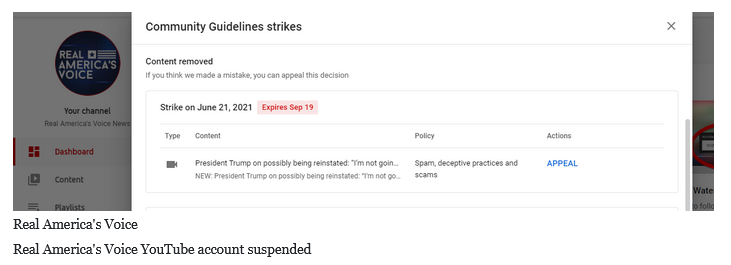This time, perpetrated by Sundar Pichai and his YouTube—which Pichai controls through his control of Alphabet and Google (the latter which is wholly owned by Alphabet) and through his Google’s ownership of YouTube.
Real America’s Voice has been suspended from YouTube for a week for posting an exclusive interview with former President Donald Trump in which he discusses the disputed 2020 presidential election.
This is an image of the YouTube notice RAV received and subsequently showed to Just the News:
The notice image is hard to read (try the right- click|open in new tab trick), YouTube claimed to RAV that the video included prohibited content that “advances false claims that widespread fraud, errors, or glitches changed the outcome of the U.S. 2020 presidential election.”
click|open in new tab trick), YouTube claimed to RAV that the video included prohibited content that “advances false claims that widespread fraud, errors, or glitches changed the outcome of the U.S. 2020 presidential election.”
Except that the video—the interview with former President Donald Trump (R)—did no such thing. It merely contained Trump’s claim of a fraudulent outcome of the 2020 election. There’s not a minim of fraud, errors, or glitches, widespread or not, in the fact of his claim. Some might—and many do—dispute Trump’s claim, but there’s nothing in the censored video that is false regarding the fact of Trump’s statements about the election or in RAV‘s recording and reporting of Trump’s statements.
Of course, Pichai knows this full well; he’s that bent on censoring speech of which he personally disapproves and over which he has the nakedly raw power to commit his censorship.
